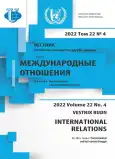Debt Sustainability of Latin American Countries in the post-COVID Economy
- Авторлар: Kuznetsov A.V.1, Morozov S.A.1
-
Мекемелер:
- Financial University under the Government of the Russian Federation
- Шығарылым: Том 22, № 4 (2022): Postcolonialism and Anti-colonial Struggle
- Беттер: 788-801
- Бөлім: INTERNATIONAL ECONOMIC RELATIONS
- URL: https://journal-vniispk.ru/2313-0660/article/view/320517
- DOI: https://doi.org/10.22363/2313-0660-2022-22-4-788-801
- ID: 320517
Дәйексөз келтіру
Аннотация
Annually growing public debt of Latin American countries is a source of a consistent increase in regional crisis potential. The COVID-19 pandemic has exacerbated political instability and deepened socio-economic imbalances in the region. The chronic dependence on debt financing increases the region’s vulnerability to external shocks and makes it much more challenging to implement public policies to achieve the UN Sustainable Development Goals. The purpose of the article is to reveal the increasing nature of the debt risks inherent in the Latin American countries, and to propose measures to overcome them. The authors summarize the views of leading Russian and foreign experts on the debt sustainability of the region. Based on the statistical data of international organizations, regional development institutions, as well as analytical materials published by Bloomberg, Fitch, White & Case or Deloitte, the authors analyze the approaches to solving the Latin American debt problem. However, considering recent debt dynamics, new public borrowings may cause a deterioration of the regional debt sustainability in the future. This issue reinforces the uncertainty in international investment circles regarding the future solvency of the Latin American region. The situation in the Latin American countries is exacerbated by the uncertainty whether positive rates of economic growth resume in the medium term that have been lost due to volatile global commodity prices. The study examines the prospects for regional economic stabilization in Latin America and the Caribbean, including through the use of new debt financing mechanisms to meet current financial needs and minimize the risks of financial vulnerability.
Авторлар туралы
Aleksei Kuznetsov
Financial University under the Government of the Russian Federation
Email: kuznetsov0572@mail.ru
ORCID iD: 0000-0003-3669-0667
Dr. of Sc. (Economics), Professor, Senior Research Fellow, Department of World Finance
Moscow, Russian FederationSergei Morozov
Financial University under the Government of the Russian Federation
Хат алмасуға жауапты Автор.
Email: tisefohero@gmail.com
ORCID iD: 0000-0003-0644-3307
Post-graduate Student, Department of World Finance
Moscow, Russian FederationӘдебиет тізімі
- Arellano, C., Bai, Y., & Mihalache, G. P. (2021). Deadly debt crises: COVID-19 in emerging markets. NBER Working Paper, (27275), 1-46. https://doi.org/10.3386/w27275
- Bárcena, A. (2021). Efectos socioeconómicos de la COVID-19 en América Latina y el Caribe y perspectivas de recuperación. Pensamiento Iberoamericano, (10), 61-87.
- Berganza, J. C. (2012). Fiscal rules in Latin America: A survey. Banco De Espana. Documentos Ocasionales, (1208), 1-41. Retrieved from https://core.ac.uk/download/pdf/322621204.pdf
- Bizuneh, M., & Geremew, M. (2021). Assessing the impact of COVID-19 pandemic on emerging market economies’ (EMEs) sovereign bond risk premium and fiscal solvency. Eastern Economic Journal, 47(4), 519-545. https://doi.org/10.1057/s41302-021-00201-y
- Blanco, F., Saavedra, P., Koehler-Geib, F., & Skrok, E. (2020). Fiscal rules and economic size in Latin America and the Caribbean. Washington, D.C.: Latin American Development Forum, World Bank.
- Cardenas, M., Ricci, L. A., Roldos, J., & Werner, A. M. (2021). Fiscal policy challenges for Latin America during the next stages of the Pandemic: The need for a fiscal pact. IMF Working Paper, (077), 1-40. Retrieved from https://www.imf.org/en/Publications/WP/Issues/2021/03/17/Fiscal-Policy-Challenges-for-Latin-America-during-the-Next-Stages-of-the-Pandemic-The-Need-50263
- Esteves, P. (2020). Latin America’s uncoordinated response in tackling COVID-19. SAIIA Policy Insights, (97), 1-17. Retrieved from https://saiia.org.za/wp-content/uploads/2020/12/Policy-Insights-97-Esteves.pdf
- Ffrench-Davis, R. (2010). Latin America: The structural fiscal balance policy in Chile: A move toward counter-cyclical macroeconomics. Journal of Globalization and Development, 1(1), 1-14. https://doi.org/10.2202/1948-1837.1051
- Herrero, A. G. (2021). Why are Latin American crises deeper than those in Emerging Asia, including that of COVID-19? ADBI Working Paper Series, (1221), 1-21. Retrieved from https://www.adb.org/publications/why-latin-american-crises-deeper-than-those-emerging-asia-covid-19
- Jeifets, V. L., & Pravdiuk, D. A. (2020). IMF presence in Latin America in the XXI century: Looking for a new paradigm of relations. Latinskaya Amerika, (10), 54-67. (In Russian). https://doi.org/10.31857/S0044748X0011331-3
- Kuznetsov, A. V., & Morozov, S. A. (2020). Latin America debt market: Sources of risks. Outlines of Global Transformations: Politics, Economics, Law, 13(6), 161-180. (In Russian). https://doi.org/10.23932/2542-0240-2020-13-6-9
- Mirabal Cano, L. P., & García Encinas, L. F. (2021). ¿Repensar la deuda pública en Bolivia? Serie Ideas y Reflexiones, (1), 1-9. Retrieved from https://iisec.ucb.edu.bo/assets_iisec/publicacion/03052021_HSS_Mirabal_Garcia.pdf
- Morales, J. A., & Wanderley, F. (2020). Reactivación económica. Bolivia Debate: Un future sustentable, 4-10. La Paz: Bolivia Debate.
- Murray, C. J. L. (2022). COVID-19 will continue but the end of the pandemic is near. The Lancet, 399(10323), 417-419. https://doi.org/10.1016/S0140-6736(22)00100-3
- Ocampo, J. A. (2015). Indefinite times. Finance & Development, 52(3), 6-11. (In Russian).
- Sturzenegger, F. (2020). ¿Necesitamos repensar la política de deuda en Latinoamérica? PNUD América Latina y el Caribe, (23), 1-32. Retrieved from https://www.undp.org/sites/g/files/zskgke326/files/migration/latinamerica/undp-rblac-CD19-PDS-Number23-Deuda-ES.pdf
- Villavicencio, G. (2021). Subordinate financialization and debt securitization in Latin America: The experiences of Argentina, Mexico and Brazil. El Trimestre Económico, 88(349), 181-200. https://doi.org/10.20430/ete.v88i349.966
- Yakovlev, P. P. (2016). The economy of Latin America in the eye of a perfect storm. Perspectives and prospects.E-journal, (4), 117-131.
- Yakovleva, N. M., & Yakovlev, P. P. (2020). Latin America: The road to Coronacrisis. Outlines of Global Transformations: Politics, Economics, Law, 13(5), 73-93. (In Russian). https://doi.org/10.23932/2542-0240-2020-13-5-5
- Zavaleta Gonzalez, J. (2020). Public debt accumulation and fiscal policy in Latin America. Investigación Económica, 79(314), 3-27. https://doi.org/10.22201/fe.01851667p.2020.314.76704
- Zvereva, V. S. (2019). China’s presence in Latin America: Present-day geopolitical realities. Bulletin MSRU. Series: History and Political Science, (2), 171-183. (In Russian). https://doi.org/10.18384/2310-676X-2019-2-171-183
- Zvonova, E. A. (2020). Transformation of the world economy and the pandemic. Ekonomika. Nalogi. Pravo, 13(4), 6-19. (In Russian).
Қосымша файлдар









